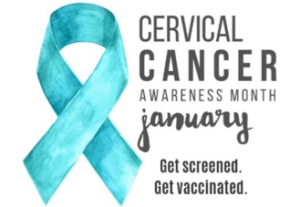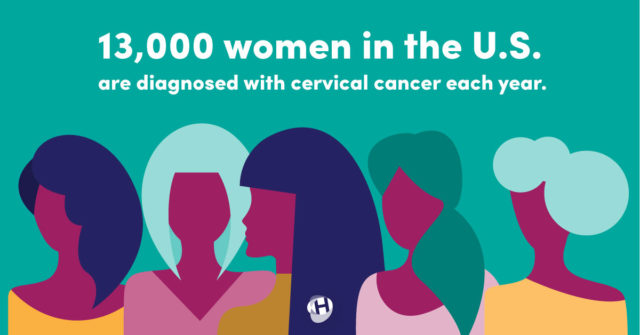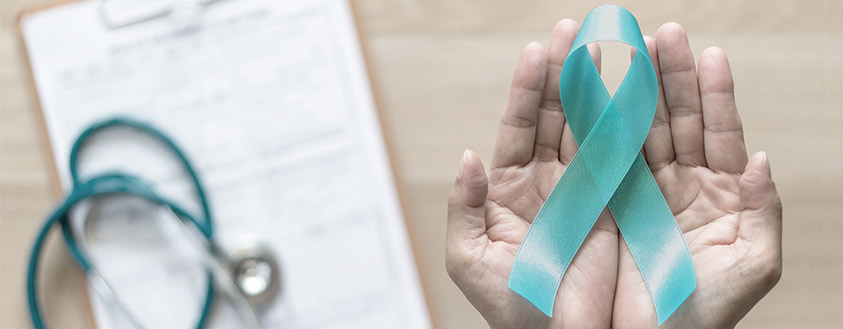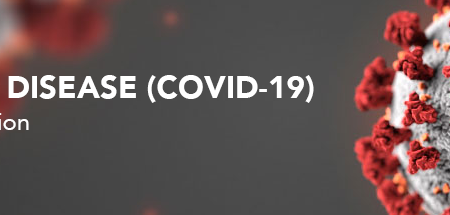January is Cervical Cancer Awareness Month

According to the National Cervical Cancer Coalition (NCCC), cervical cancer is a disease that affects approximately 13,000 women each year in the United States. Cervical cancer incidence and mortality has declined substantially over the last several decades with improved cervical cancer screening1.
Getting vaccinated for HPV early and getting screened through pap or HPV testing can greatly reduce chances of getting cervical cancer. Cervical Cancer Prevention Week begins on Sunday, January 19, 2020.
The US Preventive Services Task Force (USPSTF) announced updates to its cervical cancer screening guidelines on August 21, 2018.
Recommendations:
- The USPSTF recommends against screening for cervical cancer in women younger than 21 years.
- The USPSTF now recommends screening every five years with high-risk HPV testing (hrHPV) alone as an alternative to screening every three years with Pap testing alone among women aged 30 to 65 years.

According to recent statistics from the Surveillance, Epidemiology, and End Results (SEER) program, cervical cancer in the United States accounted for 0.7% of new cancers and 0.7% of all cancer deaths.2 This is due, in large part, to effective screening and early detection of this disease.
Despite these advances, cervical cancer screening in Medicaid remains a challenge. In 2018, the screening rate was 59.3% for Medicaid members compared to 75.2% for members in commercially insured plans.4 Texas Children’s Health Plan monitors cervical cancer screening according to nationally established benchmarks. The Healthcare Effectiveness Data and Information Set (HEDIS) is a set of standardized performance measures developed by the National Committee for Quality Assurance (NCQA) to objectively measure, report, and compare quality across health plans. This measure aligns with the following USPSTF guidelines:
- Cytology (Pap smear) screening every 3 years for women between the ages of 21 and 65
- Cytology combined with HPV co-testing every 5 years for women between the ages of 30 and 65
This month we celebrate the 10 providers who exceed the 75th percentile for this HEDIS measure:
| Provider | Compliance Rate |
| George Madjitey | 89.47% |
| Faye Bounds | 86.96% |
| Haider Afzal | 77.78% |
| Nicolas Xydas | 75.86% |
| Marcos Ikeda | 75.00% |
| Denise Leonard | 73.33% |
| Martin Gilliland | 73.33% |
| Maxie C. Sprott | 70.00% |
| Mary Lyons | 66.67% |
References:
- https://www.acog.org/Womens-Health/Cervical-Cancer?IsMobileSet=false
- Final Recommendation Statement: Cervical Cancer: Screening. U.S. Preventive Services Task Force. July 2019.
https://www.uspreventiveservicestaskforce.org/Page/Document/RecommendationStatementFinal/cervical-cancer-screening2 - https://seer.cancer.gov/statfacts/html/cervix.html
- https://www.uspreventiveservicestaskforce.org/Page/Document/UpdateSummaryFinal/cervical-cancer-screening
- https://www.ncqa.org/hedis/measures/cervical-cancer-screening/









Leave a Reply
You must be logged in to post a comment.